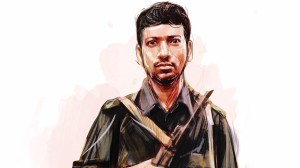Shreyas Rajagopal’s Gunboy is a disappointing cliche
The truism ‘show, don’t tell’ holds as true here as it does in most prose but it bears qualification: the reason this advice is given to novice writers is that it mimics the momentum of movies and TV, and is a shortcut to trusting the reader's intelligence
 Gunboy by Shreyas Rajagopal (Pic credit: Amazon)
Gunboy by Shreyas Rajagopal (Pic credit: Amazon)Speculations about the Next Big Thing and jokes about bestsellers subsidising the non-sellers run rampant at literary parties and sighs are expended and heads shaken about the sad state of modern-day publishing before the evening’s sorrows are forgotten in drink. Festivals are populated by the same figures every year, where the serious and literary have to settle for wispy audiences while social media stars (or, lately, bored celebrities discovering the art of the novel) draw armies. It’s no secret that people are reading less books than ever before in a media environment saturated by the Image and the novels that people are reading tend to be test-runs for TV/film adaptation, with only enough philosophical and political content to go down easy after dinner.
Gunboy by Shreyas Rajagopal is guilty on both counts. It’s the story of two boys who are often bullied at school and get a chance at retribution when a gangster comes into town with a hoard of fancy guns. Genre fiction did not use to be this bad. There is an entire chapter dedicated to the gangster admiring, cleaning and reassembling his guns because, ostensibly, the author needed to let readers know that this here is a guy who really likes guns, is really lethal and — spoiler warning — is not afraid to kill. Sample this line: “(This gun) is a cold thing, a thing of death and astounding accuracy.”
This chapter does a good job of summarising the book’s problem. The truism ‘show, don’t tell’ holds as true here as it does in most prose but it bears qualification: the reason this advice is given to novice writers is that it mimics the momentum of movies and TV, where you only ‘see’ images and you don’t ‘hear’ thoughts, so it’s easier to suck a reader into the prose by substituting circuitous thoughts with concrete images, which easily linger in the mind. But there’s another perk — it’s a shortcut to trusting the reader’s intelligence, something most novice writers struggle with. Gunboy has plenty of passages with cliched phrases like “this weight is his own” and “the pressure building inside him explodes” which say… nothing. What would have worked infinitely more is to just describe the action and move on. Sometimes we don’t need commentary about a character’s motivations and goals. Actions speak louder than words. To paying readers, buy better books. To aspiring writers, write better ones.



- 01
- 02
- 03
- 04
- 05




























